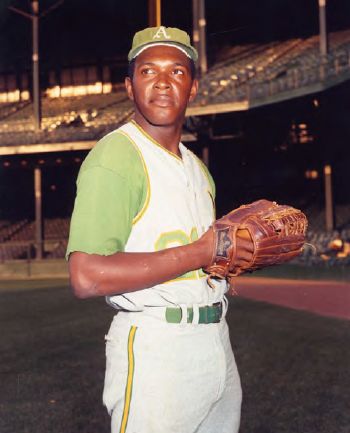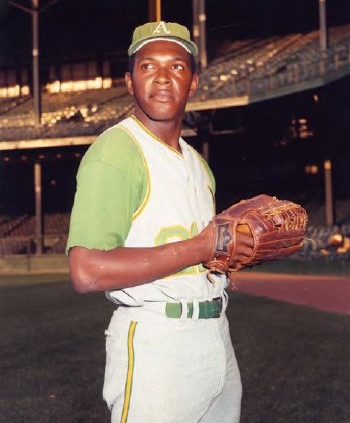August 7, 1971: Nervous Vida Blue wins his 20th game as A’s top White Sox, 1-0
 Vida Blue was nervous. He had notched his 19th win of 1971 on July 25, three days before his 22nd birthday, but lost his next start, followed by a no-decision. If the two dimes the Oakland A’s left-hander carried in his pocket1 weren’t enough pressure to remind him, the fans and media were there with their questions and expectations. He wanted to get that milestone 20th win out of the way.2 Before his August 7 start against the Chicago White Sox, he was worried: “My stomach was sour, nerves I guess. Before the game I didn’t throw that well in the bullpen. I thought I might get bombed.”3
Vida Blue was nervous. He had notched his 19th win of 1971 on July 25, three days before his 22nd birthday, but lost his next start, followed by a no-decision. If the two dimes the Oakland A’s left-hander carried in his pocket1 weren’t enough pressure to remind him, the fans and media were there with their questions and expectations. He wanted to get that milestone 20th win out of the way.2 Before his August 7 start against the Chicago White Sox, he was worried: “My stomach was sour, nerves I guess. Before the game I didn’t throw that well in the bullpen. I thought I might get bombed.”3
His A’s were rolling—their 70-40 record put them 14 games ahead of the second-place Kansas City Royals in the American League West Division. The A’s 7-0 loss in the opening game of the series a night earlier, when they managed only two hits against Chicago’s Tom Bradley, had snapped the second of their three seven-game winning streaks in 1971. The visiting White Sox were third in the same division, 3½ games behind the Royals. Blue had faced the White Sox once before in 1971, pitching a complete-game 11-2 win in Chicago on April 18.
Unlike Blue, who was making his 38th career start, White Sox starting pitcher Joe Horlen was an 11-year veteran with a 6-8 record and a 3.82 ERA. Horlen, who had spent his entire major-league career with the White Sox, had finished in the AL’s Top 10 in Adjusted ERA+ four times, leading the league in 1967. His 3.16 FIP in 1971 implied that his W-L record might have been better with better defense behind him.4
The outing did not start well for Blue. With one out he hit Mike Hershberger with a pitch and allowed a double to Walt Williams. A two-out walk to Rick Reichardt loaded the bases, but Blue escaped the inning when Mike Andrews—who had broken open the previous night’s game with a sixth-inning grand slam off Blue Moon Odom—flied out. Blue faced the minimum in the next two innings, although he did plunk Hershberger a second time, then erased him with a double play.5
For his part, all Horlen allowed in the first two innings was one walk. In the third he allowed a two-out single to Bert Campaneris and walked Rick Monday. Horlen, too, escaped without a run scoring when Reggie Jackson grounded out to first.
Blue returned the favor in the top of the fourth, putting two on with one-out singles to Reichardt and Andrews. He induced a groundout and fly out to hold the game scoreless.
Sal Bando doubled in the home half of the fourth but was left on second thanks to a stellar defensive play by third baseman Bill Melton on Gene Tenace’s liner.6
Blue seemed to settle in in the fifth, pitching a clean inning on three fly outs.
The game’s only run was scored in the bottom of the fifth inning. Dick Green opened with a double. Blue attempted to sacrifice, but White Sox catcher Tom Egan grabbed the bunt and threw him out at first, while Green remained at second. Campaneris did advance Green to third with his groundout to short.
With Monday at the plate, Green—who stole just one base in 1971—bluffed a dash to the plate. Horlen brought his hands together in the stretch and then separated them without stepping off the mound. Home-plate umpire Dave Phillips, working the first of 31 major-league seasons, called the balk and beckoned Green home.
Green was surprised that the 33-year-old Horlen fell for his bluff.7 Horlen did ask Phillips why he thought he had balked, but didn’t protest, saying, “I don’t argue with the umpires. I try to stay on their friendly side.”8 He struck out Monday for the third out.
Afterward Horlen said he wasn’t sure that he’d balked, but it reminded him of a game situation 10 years prior in the winter league in Puerto Rico—a game he’d lost 1-0 to Bob Gibson.9 It wasn’t surprising that he had to reference a game outside the majors, since this was the first (and only!) balk charged to him in his 12 seasons in the majors.
The pitchers’ duel continued: Blue allowed a double to Melton in the sixth, but neither pitcher allowed a baserunner in the next two half-innings.
Bart Johnson replaced Horlen on the mound in the seventh, yielding only a one-out single to Ángel Mangual.
Luis Alvarado opened the top of the eighth with a drag-bunt single down the first-base line. Blue got ahead of Hershberger 0-and-2, then thought he’d struck him out, but Phillips did not agree. Blue ended up walking him. With Blue glaring at the umpire, A’s manager Dick Williams visited his pitcher on the mound, trying to avoid an argument that would lead to Blue’s automatic ejection.
When Phillips came out to move things along, Williams apparently had a few words for Phillips as well. No one was ejected at that point, but the calm didn’t last long. The next batter was Walt Williams, who popped up so close to the foul line that Phillips wasn’t sure if the ball was fair or foul, so he did not invoke the infield fly rule. His failure to do so, since the ball turned out to be fair, brought Dick Williams storming back out of the dugout, leading to his ejection.10 As it turned out, it didn’t matter—Blue stranded the two runners on base with a flyout and a strikeout.
The A’s went quietly in their half of the eighth on a fly out and two foul popouts.
Trying to keep his stomach calm with Alka-Seltzers,11 Blue took the mound for the top of the ninth. He struck out Andrews and Egan. When Rich Morales hit Blue’s 125th pitch into Jackson’s glove in right field, Blue and the 27,751 fans in attendance could finally exhale.12
Afterward in the locker room, Blue expressed his relief at finally notching his 20th win, making him the first 20-game winner of the season and the first for the A’s since Bobby Shantz in 1952, when the franchise played in Philadelphia. “I’m glad it’s over. I feel like a new man in a way.” He also admitted to being tired. “I’ve pitched over 200 innings, I’ll be happy when the season’s over. My body’s beginning to feel the wear and tear of it.”13 It was also Blue’s league-leading 19th complete game.
Of course, the season, and his season, wasn’t over. Blue started 11 more games while pitching 81⅔ more innings. His total innings pitched was 312,14 in his first full year in the majors. He finished with a 24-8 record and an AL-leading 1.82 ERA. He won the AL Cy Young and MVP Awards, crowning a season in which he was the AL’s starting and winning pitcher in his first of six career All-Star Games.
Perhaps that “wear and tear” led to his poor performance in his first postseason appearance. The A’s finished their season at 101-60, 16 games ahead of Kansas City. But they lost the AL Championship Series 3-0 to the Baltimore Orioles, including a 5-3 loss charged to Blue. World Series rings would have to wait—but only until the next year. (As it turned out, Horlen, the hard-luck loser in Blue’s 20th win in ’71, joined Blue on the 1972 A’s to finish his career.15)
Author’s note
Although we lived closer to the Giants, my father took my brother and me to A’s games. Perhaps that was due to some family-friendly promotions by A’s owner Charlie Finley. I can’t say whether or not I was at this specific game, but I can say that Vida Blue was the first baseball player I knew by name. I do remember seeing Finley present him with his blue Cadillac on Bat Day (June 26, 1971).
Acknowledgments
This article was fact-checked by Bill Marston and copy-edited by Len Levin.
Sources
In addition to the sources cited in the Notes, the author consulted Baseball-Reference.com, and Retrosheet.org.
https://www.baseball-reference.com/boxes/OAK/OAK197108070.shtml
https://www.retrosheet.org/boxesetc/1971/B08070OAK1971.htm
Photo credit: Vida Blue, courtesy of the Oakland Athletics.
Notes
1 Associated Press, “Jittery Blue Wins No. 20 on His Third Try,” Los Angeles Times, August 8, 1971: D-1.
2 Herb Michelson, “Vida Blue Wins 20th Game,” Modesto (California) Bee, August 8, 1971: B-8.
3 Glenn Schwarz, “Vida Wins No. 20, No Pressure Now,” San Francisco Examiner, August 8, 1971: C1.
4 Fielding Independent Pitching (FIP) measures pitching effectiveness by focusing on the events that the pitcher has control over: strikeouts, walks, hit-by-pitches, and home runs. See “Fielding Independent Pitching (FIP),” MLB.com, accessed October 2024, https://www.mlb.com/glossary/advanced-stats/fielding-independent-pitching for the detailed formula. For the full season in 1971, Horlen’s ERA was 4.26, 1.10 runs greater than his FIP. Several other White Sox regular starting pitchers had FIP numbers less than their ERAs, but none with as great a difference as Horlen.
5 Hershberger was hit by only four pitches in 1971, so this was not a frequent occurrence. It was rare for Blue, as well: He had hit only two batters before this game. Oddly enough, they were both in the previous White Sox game on April 18, although neither batter was Hershberger.
6 Ron Bergman, “Vida Conquers Shakes,” Oakland Tribune, August 8, 1971: 37.
7 Ron Bergman, “Vital Balk Induced by Green,” Oakland Tribune, August 8, 1971: 38.
8 Bergman, “Vital Balk.”
9 Michelson.
10 Willams was ejected 57 times during his 21-year career as a manager. This was his only ejection for arguing the infield fly rule.
11 Bergman, “Vida Conquers Shakes.”
12 As of October 2024, Baseball-Reference and Retrosheet showed the attendance as 17,751, but the newspapers cited above showed 27,751. Given that it was a summer Saturday afternoon with Blue trying for his 20th win, the 27,751 seems more reasonable. The attendance at his two previous home starts was 24,434 on Friday, July 16, and 21,353 on Wednesday, July 21. Both websites have committed to the author to correct their figures to 27,751.
13 Bergman, “Vida Conquers Shakes.”
14 Although he pitched over 250 innings in several prime years of his career, he never again exceeded 300 innings.
15 Horlen’s 1971 season did not improve—he made four more starts and six appearances out of the bullpen. His ERA for the rest of the year was 6.12 (again, his FIP was 3.94, implying mediocre defense behind him). The White Sox released him during spring training in April 1972 and he was picked up by the A’s just after Opening Day.
Additional Stats
Oakland A’s 1
Chicago White Sox 0
Oakland-Alameda County Stadium
Oakland, CA
Box Score + PBP:
Corrections? Additions?
If you can help us improve this game story, contact us.


